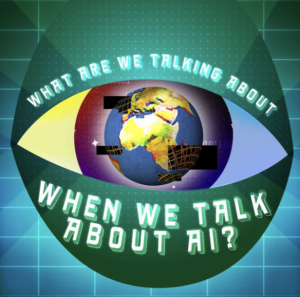UConn Humanities Institute hosts international AI symposium

Jiyoun Suk, assistant professof of communication at UConn, lead a panel during the UConn Humanities Institute's "What are we talking about when we talk about AI?" symposium in the Homer Babbidge Library on Thursday, Oct. 9, 2025. (Sydney Herdle/UConn Photo)
On Oct. 9, an interdisciplinary and international group of scholars gathered at the UConn Humanities Institute (UCHI) to discuss "a deceptively simple question": What are we talking about when we talk about AI?
UCHI Director Anna Mae Duane introduced the symposium with this framing to illustrate the disciplinary and cultural differences that are often unacknowledged in conversations about artificial intelligence or large language models (LLMs). Pulling apart the terms themselves, she asked attendees, "What does 'learning' mean to an education specialist, or to a computer scientist? What does 'intelligence' mean to a philosopher, or to a historian?"
The symposium was the pièce de résistance of the UCHI project "Reading Between the Lines: An Interdisciplinary Glossary for Human-Centered AI." (See past coverage in UConn Today here.)
Funded by a $25,000 grant from the Consortium of Humanities Centers and Institutes, "Reading Between the Lines" put UConn scholars from various disciplines into conversation with scholars from the International University of Rabat (UIR) in Morocco.
Through a series of four podcast episodes, these scholars are tackling topics swirling in the AI ecosystem. Three of the episodes have been released so far, exploring the subjects of Justice, Education, and Learning.
The idea behind the international collaboration, Duane explains, was to incorporate perspectives on AI outside the American perspective. Linguistic, religious, and cultural differences can all impact the ways a society conceptualizes and uses AI. On the podcast, Duane defines the project as an "anti-glossary."
"If a glossary is a place where we all decide on one definition and go from there, we are much more interested in leaning into the fact that we all have different definitions of terms that people feel are self-explanatory," Duane says. "If we're going to really have an expansive, inclusive, liberatory, emancipatory AI - which is all of our goals - we need to start with how we talk about it."

New Tech, Old Feelings
The first panel in the symposium focused on the concept of care. Jiyoun Suk, assistant professor of communication at UConn, chaired the panel, opening with a guiding question: "How is AI changing how we care for each other?"
Duane (who is also a professor of English at UConn) weighed in, alongside UIR professors Ihsane Hmamouchi (assistant professor of clinical epidemiology) and Ouassim Karrakchou (assistant professor of computer science and engineering).
Citing her recently published research, Hmamouchi spoke to the challenges healthcare providers across the world are encountering when using AI in clinical settings. She pointed out that LLMs which do not fully understand non-English languages - including regional dialects - will have a flattening effect on patient care.
"Care begins with language," Hmamouchi said. She advocated for healthcare providers to take advantage of the benefits AI can offer, but to ensure that these technologies are being used responsibly and ethically - and still being mindful of their deficiencies.
In the first afternoon session, participants discussed the concept of AI literacy. UConn adjunct professor of English Tina Huey moderated the panel, composed of fellow UConn faculty Anke Finger (professor of German and comparative literature); Arash Zaghi (professor of civil and environmental engineering); and Ting-An Lin (assistant professor of philosophy); as well as UIR computer science professor Hakim Hafidi.
In her presentation, which explored the subject of AI literacy through the history of German literature, Finger discussed how fears of AI-like "automatons" have appeared in German fiction from over a century ago.

"These anxieties are not new," she said. Finger analyzed how literature can show us how humans have historically grappled with fears of emerging technologies - the kinds of futures, whether dystopian or utopian, writers have imagined these technologies ushering in.
In his presentation, Zaghi advocated for more equitable access to AI literacy. He shared an anecdote of traveling to various high schools across Connecticut to lead microscope demos with the students.
In high schools in higher-income areas, he recalled, the students engaged with the microscopes confidently, experimenting with various techniques and settings when they were given free rein to explore. But in lower-income areas, the students were more hesitant to even touch the equipment. To Zaghi, this suggested that they had not been taught to imagine these tools could be "for them."
Likewise, argued Zaghi, AI is being used most heavily by the most privileged people, while people who could benefit even more from its use are being discouraged from exploring its capabilities.
Sharing her perspective as an ethicist, Lin added that the topic of "AI literacy" should also include a dimension of critical AI literacy, meaning AI-literate users can think accurately about how AI outputs are generated and what biases may be embedded within them.
"I want us to be careful of the tendency to think that technology can just solve everything," she said. "Technology can help, and we cannot deny that, and we shouldn't fear that, but at the same time, there are often more resources that are needed. And we should continue to be critical of the current systems -- who define them and how the power dynamics are working."
The day's final panel was on the theme of rights: How will AI transform property rights, labor rights and human rights? How does language shape this process?
Chaired by UConn assistant professor of journalism Brad Tuttle, the panel included John Murphy (UConn assistant professor-in-residence of digital media business strategies); Avijit Ghosh (UConn RIET Labresearch affiliate and policy researcher at the AI company Hugging Face); Meriem Regragui (UIR professor of law); and Michael Lynch (UConn Provost Professor of the Humanities and Board of Trustees Distinguished Professor of Philosophy).
"AI can help people know more about the world faster than ever before. But the more unquestioning our trust of AI becomes, the more we rely on it to figure things out for us, the less reflective and creative we become," said Lynch. "We know more facts; but we understand less."
From law, to medicine, to education, to philosophy, an astonishing array of disciplines were represented at the international symposium. In keeping with the core principles of UCHI, scholars reached across cultural and linguistic lines in the pursuit of knowledge.
Those curious should stay tuned for the final installment in the podcast series, on the subject of literacy.






